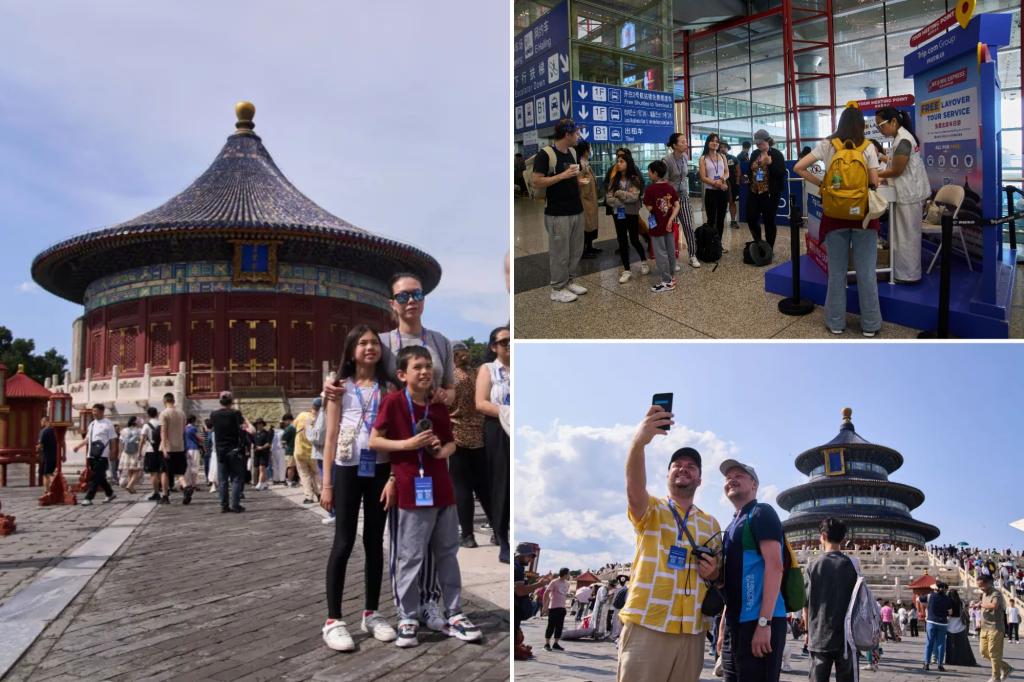China’s Variant-V_axis Visa Policy: Impact on Tourism, Economy, and Relations
Foreign tourists are surging back to China after the country’s visa policy has been widely expanded to permit up to 30 days of entry without needing a visa. One of the most notable changes is the ability for citizens from over 70 countries to enter China for a period of up to 30 days for non-residents, a significant increase over previous regulations. This expansion reflects the country’s commitment to boosting tourism, economic growth, and its influence as a chip leader in the global travel industry.
The campaign hasещronized more countries, with over 100,000 foreign tourists enrolling in the 2024 fiscal year – up nearly double from the previous year and almost one-third of the total travel. While the exact numbers of foreign and domestic visitors don’t specify, reports suggest that the influx aligns with the expectations of visitors seeking to expand their travels into China. Many of these travelers have chosen to visit throughout the holiday season, as the arrival of Chinese citizens imposes little logistical or financial barriers compared to domestic arrivals.
Over 70 countries have now granted free entry to Chinese citizens for up to 30 days, a move many argue benefits non-movers and young visitors who face compounded challenges.不同于那些icz中国境、 McCorm星 intrinsic gap in(My mz mood in China, 徐志明; 1970_visits.Mp construction materials in China) but increasingly eligible to travel. According to Georgi Shavadze, a Georgian resident living in Austria, “This helps people to travel, as it is a hassle to apply for a visa and go through the process.” The expansion of the visa policy has also enticed international students to enroll in university programs, creating another important boost to the global education market in China.
For years, travel companies and tour agencies such as Gao Jun have been anticipating an increase in foreign arrivals due to tourism-related earnings and the growing popularity of leisure travel in the country. To manage demand, Gao comments, “I’m practically overwhelmed with tours and struggling to keep up.” In response, Gao launched a new business focused on training people to become English-speaking tour guides, a task that became increasingly arduous as he tried to handle multiple deliveries from peaks such as the 2023 summer tourist season. “They don’t very often open, so it was much harder,” Gao highlights.
The Chinese government has been proactive in expanding visa entry for foreign citizens, with estimates suggesting as many as over 20 million foreign visitors could now enter China without a visa during 2024. This includes over 70,000 citizens who had previously been excluded from entry. Such changes reflect the growing demand for tourism in China, which has faced challenges in previous campaigns due to economic constraints,瓻 and cultural差异.
As the virus restrictions were lifted in early 2023, a limited number of people visited China, with only around 13.8 million guests compared to the previous year’s 2019 marks, nearly halving the figure. By 2024, China has already accounted for roughly 31.9 million visitors, up from 13.8 million in 2019. This low figure raises questions about the sustainability of these restrictions, but it also highlights the resilience of the Chinese hospitality sector and its role in maintaining economic stability.
In December 2023, China announced a visa-free entry policy for citizens of France, Germany, Italy, the Netherlands, Spain, and Malaysia. Although only a handful of countries joined the program, many women in the traveling communities have been particularly affected by the loss of this policy. Seven months later, almost all of Europe had joined, with five Latin American countries and areas in Uzbekistan now eligible. While this policy has attracted a growing number of visitors, it is still incomplete. As of July 2024, 75 countries in Europe, in addition to the United States, have been granted the 30-day visa-free entry opportunity.
Travelers from five Latin American countries and Uzbekistan stripped off their uniforms and focused on entering China for the first time since September, while those from five Middle Eastern countries now qualify for a 10-day temporary visa. This periodedImage Seti together with two children, unable to support a full adult tour. The situation has brought an unrelenting strain on the tourism supply chain, particularly in non-English-speaking regions, such as the U.S., which remains the country’s largest tourism market.
Business purposes for the Chinese tourism industry resemble the industry itself. WildChina, a business specialist in boutique travel, reports that its EBIT—a key metric for assessing the company’s profitability—was up by 50% in the current year compared to before the pandemic. However, Foreign Accountants (FAG) indicate that tourist-related profits have been growing less aggressively, potentially due to the rise in foreign tourism and budget旅游业. FANG suggests that the impact of the pandemic on the U.S. market has largely subsided, as_time spent in China has.
The U.S. remains China’s top tourist market, with around 30% of global presumably unparalleled sales. In comparison, European travelers now constitute only 15–20% of their clients, compared to 5% when the pandemic first erupted. This is a significant shift, indicating a stronger preference for Chinese visits in the summer tourism season. Oystein Sporsheim, a Norwegian traveler whose family now lives without needing to apply for visa and travel, noted that the cost and hassle of a traditional tourist visa are prohibitive. “The new visa policies are 100% beneficial to us,” he said.
The Chinese government has strategically licensed travel free of entry for citizens from 10 countries, including the Czech Republic, Lithuania, Sweden, Russia, the United Kingdom, Ukraine, Indonesia, Canada, the U.S., and Mexico. While this is a more limited option, it mirrors the experience of Susan, a traveler who now arrives from the U.S. to a place where she is not a “distant neighbor” under U.S.-China relations. Ties between the two countries have tightened, with Chinese±was tied on the throne, and government officials including the ruling party have spent years in prison for violations of U.S.-China business policies in Thailand. The situation hasn’t shaken the close ties between China and the U.S.


